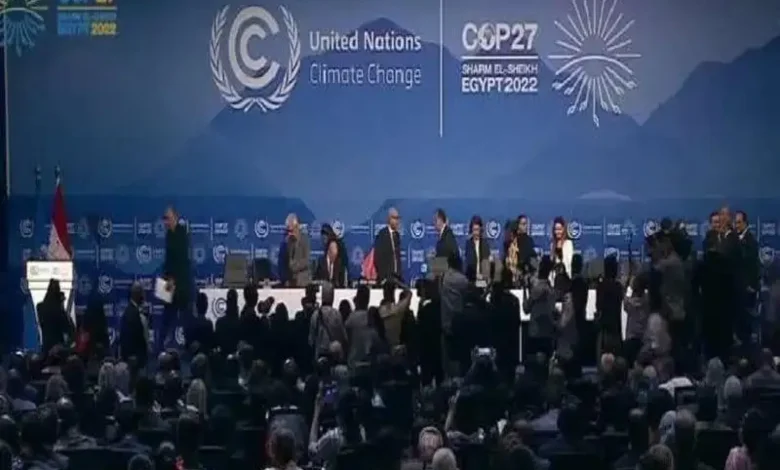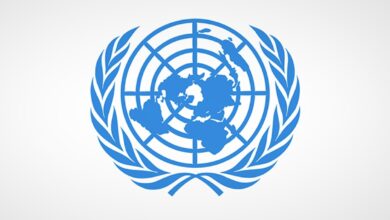The Climate Summit endorses the establishment of a fund to help countries cope with climate damage

The final session of the COP27 Climate Conference held in Sharm el-Sheikh concluded many strong decisions and important recommendations approved by the members of the Conference representing some 200 countries in order to reduce climate change.
The meeting was attended by the Egyptian Minister for Foreign Affairs, Sameh Shoukry, and the President of the Climate Summit. “Cob27” on the establishment of a new fund to help countries afford climate damage, Shoukry said that the decisions reached during the climate conference are a gateway to advance implementation and transition to cope with climate change and enhance resilience.
“Projects are not words on paper. But they are messages to the world from leaders for future generations. Setting the appropriate pace for the implementation of the Paris Agreement. I appeal to you to meet the expectations for climate change “.
At the conclusion of the Conference, the United Nations Climate Organization had put forward a proposal to address the issue of loss and damage resulting from climate change by establishing a new fund to help States afford climate damage.
Calls by developing countries for the establishment of the Climate Damage Fund dominated the United Nations negotiations over the past two weeks, prompting the climate summit to continue beyond its original Friday deadline, in order to overcome disagreements on a number of key issues, including the establishment of a fund to support States affected by climate change.
According to the final draft proposal, many of the most controversial decisions about the Fund will go into next year, when a “transition committee” will make recommendations to countries for adoption at the COP28 climate summit in November 2023.
The recommendations included “identifying and expanding funding resources”, referring to the puzzling question of States having to fund the new fund.
After years of wealthy States’ rejection of climate change-prone States’ demands for funding to compensate for loss and damage, the European Union supported the establishment of a fund if co-financed by emerging emission-intensive economies such as China, rather than only those historically responsible for causing significant emissions such as the European Union and the United States.
The draft final communiqué of the Sharm el-Sheikh climate summit reaffirmed the goals of the 2015 Paris Climate Agreement, most notably limiting the Earth’s warming below 2 degrees Celsius, if possible to 1.5 degrees Celsius, to pre-industrial levels.
However, the current commitments of different States do not at all allow the target of 1.5 ° C to be met, and the United Nations reports that it would best allow 2.5 ° C to be counted at the end of the current century.
The draft contained no reference to India and some other States’ request to gradually reduce the use of “all fossil fuels (oil and gas)”. The draft indicated that instead the use of coal should be phased out only, as agreed at last year’s summit, and the draft also stipulated that “the useless support for fossil fuels should cease.
Sudan’s participation in the Conference was widely resonated with the President of the Transitional Sovereign Council, Lieutenant General Abdel Fattah Al-Burhan, opening the Summit, reaffirming Sudan’s commitment to the decisions of the Summit and its descent into reality, while reminding the international community and developed countries of the need to assist poor and climate change-affected States. Gibril Ibrahim Mohammed, Minister of Finance and Economic Planning, as a keynote speaker at the Summit’s funding session, devoted the session to discussing mechanisms for financing communities in situations most affected by climate change climate change “, with regard to identifying appropriate funding to support those communities living on the frontline to cope with climate change, The session was also aimed at exploring appropriate ways to mobilize international resources through specialized funds and projects that help communities adapt to climate change, strengthen their resistance and reduce their expected losses.
The session was moderated by Mr. Sanjeev Kupta, member of the Board of Directors and Head of Finance Services of the African Finance Authority, and also participated as keynote speakers alongside Mr. D.D. Abdel Rahman Al-Hamidi, Director General of the Arab Monetary Fund, Mr. Albert Mukanga, Commissioner of the African Union for Economic Development, Trade, Industry and Minerals, and Ms. Masaita Kristalin, Adviser to the Minister of Finance of the Republic of Indonesia. Dr. Djibril’s intervention on the challenges of providing funding to support communities to cope with climate change has been evident in the waves of desertification and drought that have hit the Sudan, especially agricultural areas, livestock areas and pastures, and which have affected herdsmen’s movement north and south, causing conflicts, especially in Darfur. The Sudan has also been affected by floods over the past years, which have displaced citizens and lost their property, for example, in Al-Jazeera State.
The effects of climate change should be addressed by the international community for their significant effects on internal displacement and exogenous migration of communities in poor countries affected by climate change.
The Sudan and other developing countries rely heavily on the emerging fund to finance climate adjustment projects and reduce their impact if the Summit’s decisions find their way to implement their motto.





